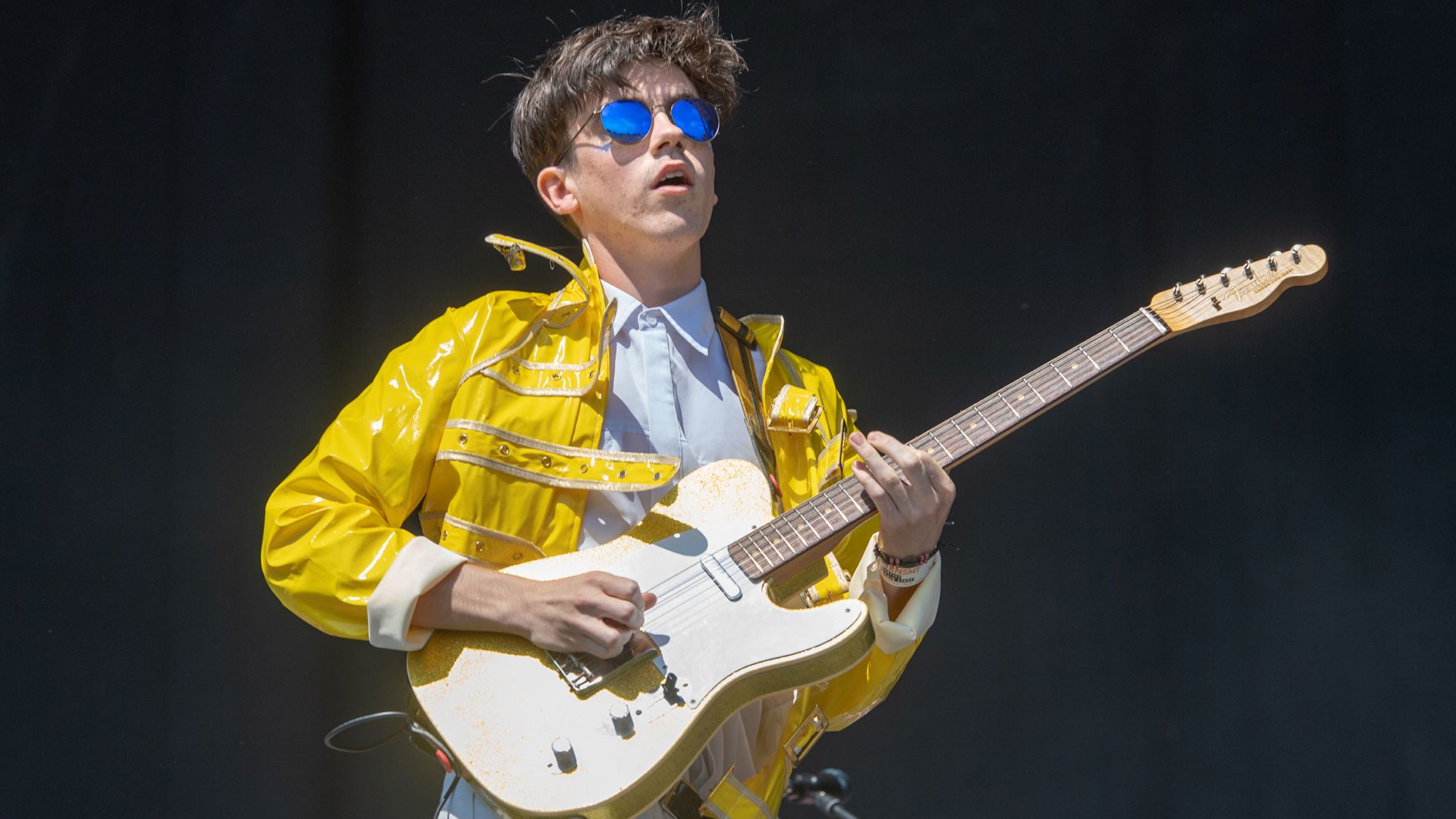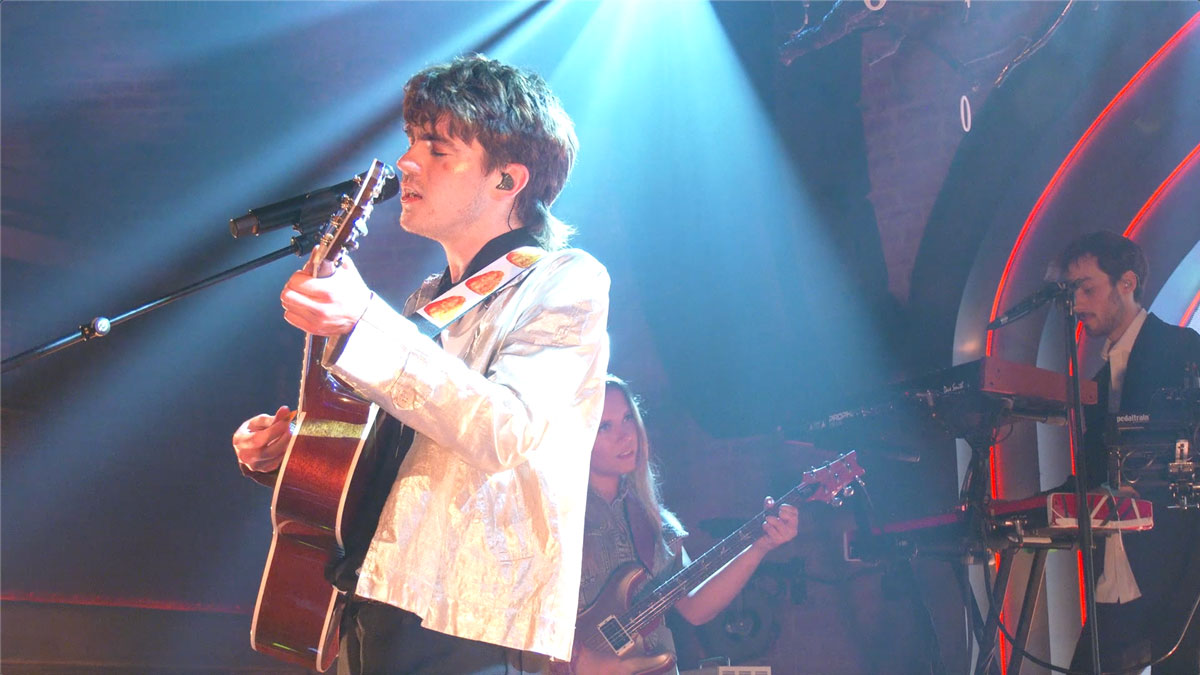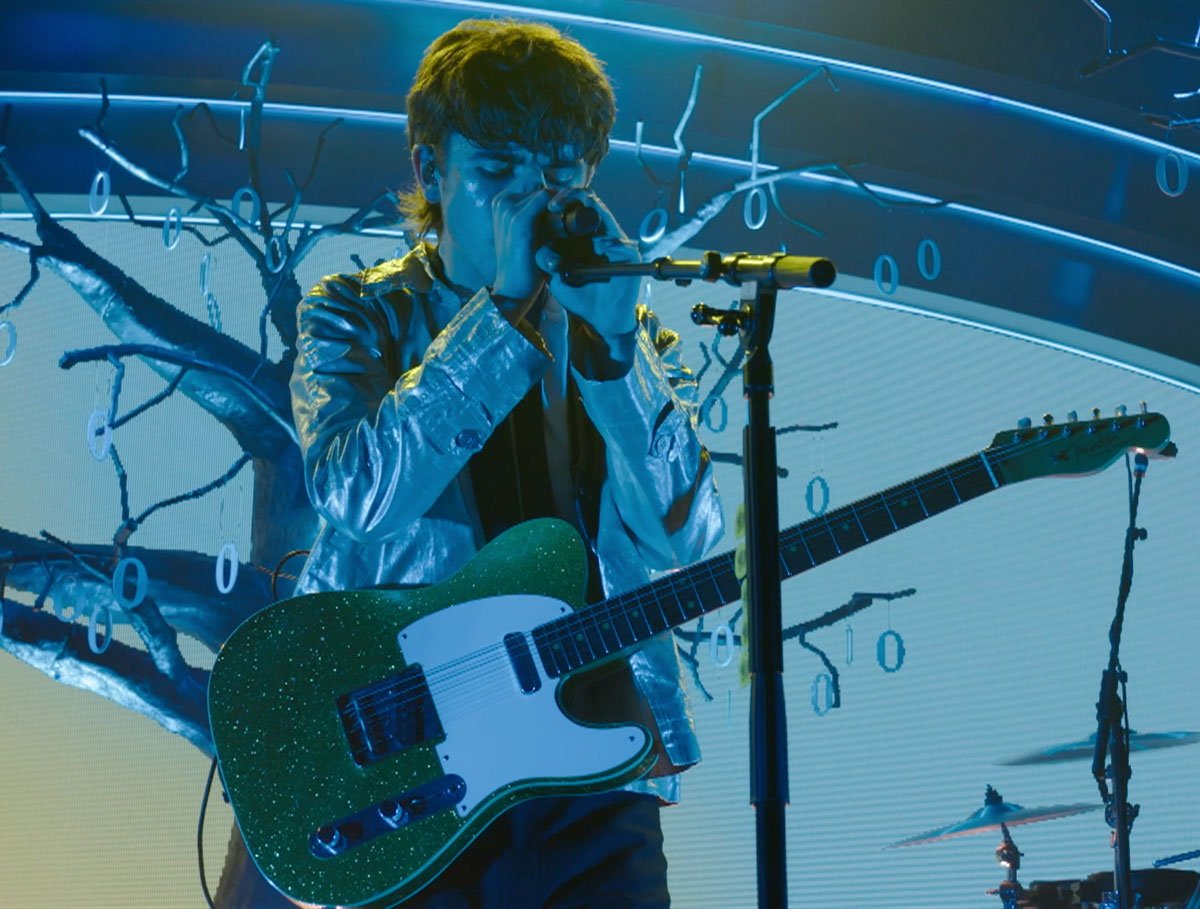Declan McKenna: “Guitars are just planks of wood, but they help us translate the most difficult aspects of life”
We chat with the UK singer-songwriter about the gear and themes behind his enrapturing new album Zeros, and being dubbed the 'voice of a generation'

All the latest guitar news, interviews, lessons, reviews, deals and more, direct to your inbox!
You are now subscribed
Your newsletter sign-up was successful
Zeros, the second record from UK singer-songwriter Declan McKenna, captures the current sense of apocalyptic dread and turns it into an ecstatic fireworks display. It’s inspired by everything from the glam pomp of '70s British rock and Bowie’s space fantasies to St Vincent’s theatrical fretboard mechanics.
Dubiously feted as ‘the voice of his generation’ and courted by a milieu of labels from the age of 15, McKenna’s rise has been pretty astronomical, itself. Whether it’s cause or effect, he thinks about the big stuff: politics, youth, corruption, dystopian visions and the contempt found festering in the dark, divisive corners of the web.
Zeros sees him produce something positive from his anxieties, as if noting that, yes, the world is on fire, but let’s at least toast some marshmallows.
On the line from his home in North West London, McKenna told us about the making of Zeros, the exhilarating experience of working with Jay Joyce and a guitar approach best described as ‘enforced chaos’…
There’s been a lot of weirdness lately. What is a musician even for in 2020?
“Making life livable. It is bleak and it's not exactly an exhilarating time for musicians, but there's always art out of hardship, there's always art out of turbulence.
“So many things are translated through music – that's the beauty of it. If everyone's experiencing something, someone's going to put it into music and at some point, it will feel right. Whether it's something completely removed from the bleakness of the world right now, or whether it's a reflection [of the times], I think that's something artists do well."
All the latest guitar news, interviews, lessons, reviews, deals and more, direct to your inbox!
Zeros was made in Nashville with Jay Joyce, before the pandemic. I remember speaking to the Brothers Osborne and they were really positive about Jay, but said that there was some tension at points and “He really knows what buttons to press.” What was your experience?
When I'm recording on my own and doing stuff at home, getting stuff setup is just the worst. I lose all of my energy to work on music, just fucking around with cables and things!
“I had a great experience. I heard all sorts of stuff about him from a good few people, but for us it was super positive. I found him really, really encouraging to work with. He knows what he likes and I think that's good in producers, where they can be direct with you.
“I never felt an awful lot of aggression with Jay Joyce, he's very chilled and it felt like it was constantly flowing. There was a day when we were doing Don't Make A Fool Of Yourself, which didn't make it onto the album, where we were all hungover from Isabel, my guitarist's, birthday.
“I was playing on a Rhodes and eventually he was just like: 'Declan… Stop playing.' [laughs] But, you know, it really was quite exciting and that studio was very fast-paced. Any time I wanted to play something, it was just in front of me.
“It's so perfect, because when I'm recording on my own and doing stuff at home, getting stuff setup is just the worst. I lose all of my energy to work on music, just fucking around with cables and things! Him being there and having a team around him that was so on the ball was really inspiring.”

How has your guitar playing changed since the first album? People tend to make quite a big leap between their first two records, it seems.
“I think I’ve become a better guitarist. I understand the ways in which I can insert the right energy into my playing. I’ve become a lot more comfortable with my instrument and relaxed a lot. I’ve become able to find simpler ways to make things interesting and stop going back to the same things.
“I remember writing songs aged 14/15 and always putting in barre chords, which is good but just not needed in every song. I’ve spent more time in studios and learned to look a bit deeper and find something a little bit simpler.”
How long has your co-guitarist Isabel been playing with you?
Isabel has been a virtuoso as long as I’ve known her, though. She can mould herself to do pretty much anything she wants with a guitar
“Since I was about 17. She didn’t play on the first record, none of my band did, but this one was meant to be more of a ‘band record’. It’s been cool. We’ve all learned how to play together, how to be a band.
“I started out with a musical director and I didn’t fully know what I wanted, because I’d just been loop pedaling for however long, so it gave us time to find our own space. Early on, you are trying to fill the space, but having a full sound is often more about the space than ‘the fullness’ and you can really overfill.
“That’s something we all learned from playing together. Isabel has been a virtuoso as long as I’ve known her, though. She can mould herself to do pretty much anything she wants with a guitar.”

How would you define your parts in comparison to Isabel’s? Where do we hear each of you in the new recordings?
“My parts are anything that’s more, er, out of time! The stuff that is more scratchy, the more violently played or random-feeling. Isabel is a bit more smooth and a quite delicate guitar player and she’s very technically good.
“She covers a lot of the more specific parts and anything that needs to be consistent. She’ll do the solos that are a bit more melodic and I would do the stuff that is a bit more chaotic. I’m trying to exacerbate the emotions with the way that I’m playing. I sometimes feel like I’m more of a right-hand player than a left-hand player. I feel like you can really drive so much emotion with it.
“We differ in that way, which is great. It leads to a nice balance in the songs. But there’s a bit of ‘enforced chaos’ to my playing. I know I’m putting it in there, but it’s the way I like to play.”
You mentioned enjoying the full resources of Jay’s studio setup. What guitars were you using on the record?
Isabel will do the solos that are a bit more melodic and I'll do the stuff that is a bit more chaotic. I’m trying to exacerbate the emotions with the way that I’m playing
“We were changing a good bit. I had a Fender Mustang that I was really into, just because it was so twangy and I was getting all this whammy stuff out of it. I also bought a Gibson Les Paul Jr while I was in Nashville, but that was kind of at the end of it.
“Then Jay had a load of cool guitars, which we were trying out. One was this Vox semi-hollow, which we we used all over the record. He had a Jazzmaster with flat-wound strings, which we used on one of the cuts that didn’t make the record, but that was so cool.
“I did bring some guitars with me, but I just wanted to use Jay’s stuff all the time. He had a lot of older guitars, as well, like five or six racks to pick from every day, so being a guitar fan, it was just about trying all of that stuff!”
Which of your own instruments did you use?
“The ones of my own that got into it were like a Fender Meteora. I’ve got a new one of those and I was using that a fair bit. Then I’ve brought my gold sparkle Fender Custom Shop Telecaster and the Mustang, as well. But it was so varied.”
The Fender Meteora is quite a new model and it’s still quite rare to see them in the wild. What do you like about it?
“The thing that felt really good was just shredding on it, when I first got it. Those parts, early on, when I was just noodling stuff. It’s quite space-age looking and has a really powerful feel to it, so when it came to those solos and little bits of chaos, I was often just turning to the Meteora.
“I have a lot of Fender-y guitars, but it feels a little bit more butch, this one. Anything that looks kind of weird or off-center, I love that. The Jag-Stang, for instance, I’ve always wanted to get my hands on one of those…”
What about pedals and other parts of the signal path?
“One of the main pedals I was using a lot was my MWFX Judder, which I use live, as well. That was cool. I don’t know what you’d call it, it’s like a fast delay or a sampler. It just plays back very harshly and sharply. You can take a solo into another dimension with it.
I have a lot of Fender-y guitars, but my Meteora feels a little bit more butch. Anything that looks kind of weird or off-center, I love that
“That’s used all over the record, whether it’s the little one-note repeating, pad-y sort of stuff, or the more intense solos, like on Beautiful Faces where the pitch is wavering and everything is going berserk.
“So that was my constant companion and Isabel was using one, too. She was doing a lot of Whammy pedal sounds, too. The Space Spiral by Earthquaker Devices was really cool, as well.
“We did a few different things with the guitars, though. On Beautiful Faces, I just wanted my guitar to be really harsh and direct, so we were straight into the desk with that one. Then on some of them we were recording amps out in the main hall and capturing all that space.
“Again, as well as our normal pedals, Jay has this like infinite catalogue of things that we were messing around with, putting Mellotrons through my Moogerfooger pedals and things. A lot ended-up going through amps, even though they weren’t guitars.”

You did a great job of updating that fizzy, glam distortion tone. Were you thinking much about nailing those tones?
“A little bit. Something Kevin Parker [of Tame Impala] said, which I think makes a lot of sense when it comes to writing and the creative process, was that you have these old sounds in your head, whether it's the bass from a Motown track, or the drums from a Beatles track.
“You can listen to it and kind of create it, but often the more warped, more-fucked version that's in your head is the thing to follow, because you get something stranger out of it. So we did end-up with some glam-y moments, but we were using the tools at our disposal to make it more current.
“I love St Vincent's guitar sound – the fuzziness with that sort of digital edge to it. I try and find that where I can, like on the Beautiful Faces solo where I'm going up and down like some sort of clunky machinery, or Isabel on Be An Astronaut – she's constantly trilling on the whammy and getting this glam sound, but with these glitches that give it fresh perspective."
You've played the House of Commons [UK government building] in the past, you've had to live with the 'voice of a generation' tag since the age of 15 and, as ever, you're discussing big themes on this record. Do you ever find yourself look at this this thing that got you here – this plank with six strings on it – and think, 'This is ludicrous...' Essentially, we’re asking: why do we listen to musicians?
Many times you may feel alone in the world, but the right record pulls you back to realizing that many people have gone through the same thing
“Yeah. It is weird and sometimes you do just want to be like, 'I'm not telling you to listen to me. That's not where I'm going with this…’ It is just music at the end of the day. But music is important. We get through many of the most important trials of our lives, through music.
“Instruments are just planks of wood, or just computers or whatever, but they help us translate the most difficult aspects of life and make the conversations we have much easier and much more universal. Many times you may feel alone in the world, but the right record pulls you back to realizing that many people have gone through the same thing.
"Even past that, the feeling of when something is done right is so exhilarating and so important. When you find a great record, it feels like you've won the lottery. It's amazing. So I couldn't really think of anything else I could do in the world that would feel more right or more important. I've never had anything in my life that I could create that felt more valuable than music. It is just art, but art is important!”

Matt is Deputy Editor for GuitarWorld.com. Before that he spent 10 years as a freelance music journalist, interviewing artists for the likes of Total Guitar, Guitarist, Guitar World, MusicRadar, NME.com, DJ Mag and Electronic Sound. In 2020, he launched CreativeMoney.co.uk, which aims to share the ideas that make creative lifestyles more sustainable. He plays guitar, but should not be allowed near your delay pedals.
